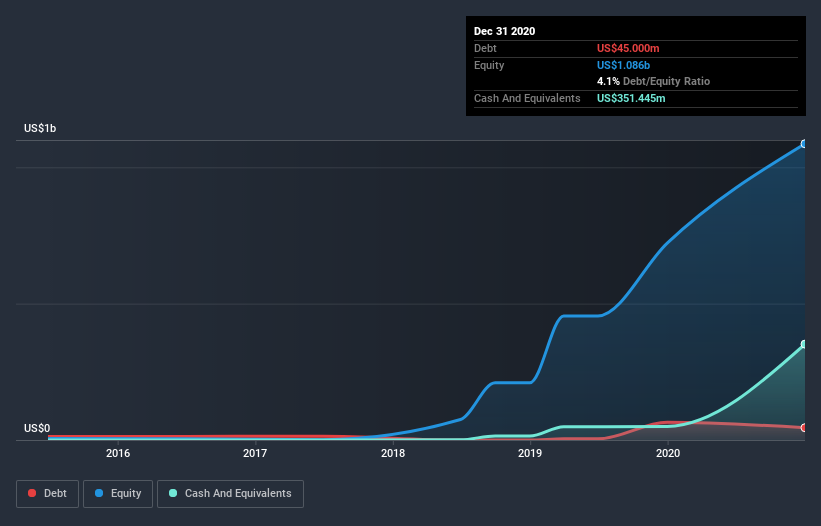Here's Why Nickel Mines (ASX:NIC) Can Manage Its Debt Responsibly
- Oops!Something went wrong.Please try again later.
Warren Buffett famously said, 'Volatility is far from synonymous with risk.' So it might be obvious that you need to consider debt, when you think about how risky any given stock is, because too much debt can sink a company. Importantly, Nickel Mines Limited (ASX:NIC) does carry debt. But should shareholders be worried about its use of debt?
When Is Debt Dangerous?
Debt and other liabilities become risky for a business when it cannot easily fulfill those obligations, either with free cash flow or by raising capital at an attractive price. If things get really bad, the lenders can take control of the business. However, a more frequent (but still costly) occurrence is where a company must issue shares at bargain-basement prices, permanently diluting shareholders, just to shore up its balance sheet. By replacing dilution, though, debt can be an extremely good tool for businesses that need capital to invest in growth at high rates of return. When we examine debt levels, we first consider both cash and debt levels, together.
View our latest analysis for Nickel Mines
How Much Debt Does Nickel Mines Carry?
As you can see below, Nickel Mines had US$45.0m of debt at December 2020, down from US$65.0m a year prior. However, its balance sheet shows it holds US$351.4m in cash, so it actually has US$306.4m net cash.
How Healthy Is Nickel Mines' Balance Sheet?
The latest balance sheet data shows that Nickel Mines had liabilities of US$57.7m due within a year, and liabilities of US$90.7m falling due after that. Offsetting these obligations, it had cash of US$351.4m as well as receivables valued at US$117.8m due within 12 months. So it can boast US$320.8m more liquid assets than total liabilities.
This short term liquidity is a sign that Nickel Mines could probably pay off its debt with ease, as its balance sheet is far from stretched. Simply put, the fact that Nickel Mines has more cash than debt is arguably a good indication that it can manage its debt safely.
Nickel Mines's EBIT was pretty flat over the last year, but that shouldn't be an issue given the it doesn't have a lot of debt. There's no doubt that we learn most about debt from the balance sheet. But it is future earnings, more than anything, that will determine Nickel Mines's ability to maintain a healthy balance sheet going forward. So if you're focused on the future you can check out this free report showing analyst profit forecasts.
But our final consideration is also important, because a company cannot pay debt with paper profits; it needs cold hard cash. Nickel Mines may have net cash on the balance sheet, but it is still interesting to look at how well the business converts its earnings before interest and tax (EBIT) to free cash flow, because that will influence both its need for, and its capacity to manage debt. During the last two years, Nickel Mines produced sturdy free cash flow equating to 51% of its EBIT, about what we'd expect. This free cash flow puts the company in a good position to pay down debt, when appropriate.
Summing up
While we empathize with investors who find debt concerning, you should keep in mind that Nickel Mines has net cash of US$306.4m, as well as more liquid assets than liabilities. So we don't think Nickel Mines's use of debt is risky. The balance sheet is clearly the area to focus on when you are analysing debt. But ultimately, every company can contain risks that exist outside of the balance sheet. For example Nickel Mines has 2 warning signs (and 1 which is potentially serious) we think you should know about.
When all is said and done, sometimes its easier to focus on companies that don't even need debt. Readers can access a list of growth stocks with zero net debt 100% free, right now.
This article by Simply Wall St is general in nature. It does not constitute a recommendation to buy or sell any stock, and does not take account of your objectives, or your financial situation. We aim to bring you long-term focused analysis driven by fundamental data. Note that our analysis may not factor in the latest price-sensitive company announcements or qualitative material. Simply Wall St has no position in any stocks mentioned.
Have feedback on this article? Concerned about the content? Get in touch with us directly. Alternatively, email editorial-team (at) simplywallst.com.


